According to a 2021 Gallup survey, 7.1% of Americans identify as lesbian, gay, bisexual, or transgender. Many of them face discrimination that imperils their health and curtails their access to healthcare. Consider these findings from a nationally representative survey of lesbian, gay, bisexual, transgender, and questioning and/or queer (LGBTQ) people conducted in 2020 by the Center for American Progress:
Last summer, second-year Einstein medical student Patryk Kubiszewski combed the medical literature for protocols for caring for adolescent LGBTQ patients. He was shocked by what he found—or, rather, failed to find.
“I didn’t realize that I’d run into an utter lack of consistent guidelines regarding healthcare for adolescents who are nonbinary [do not identify exclusively as men or women] or transgender [identify as genders different from the ones assigned at birth],” Mr. Kubiszewski says. In particular, he says, “mental-health care for this often vulnerable population is wildly inconsistent, and young people may have very different experiences depending on where they live.”
Mr. Kubiszewski, who is gay, says that he dreamed as a teenager of becoming a psychiatrist and studying LGBTQ health. “I’ve had positive interactions with healthcare providers who didn’t make assumptions and weren’t judgmental about gender or sexuality,” he says. “But many people in the LGBTQ community aren’t so fortunate.”
Mr. Kubiszewski expects to publish his review of mental-health care for transgender and nonbinary teens this summer, and he is looking forward to putting his education to work in real life: interacting with LGBTQ patients who have post-traumatic stress disorder and taking their histories as part of a project with a psychotherapist. “Seeing patients in the community during my third-year rotations will be a nice next step,” he says.
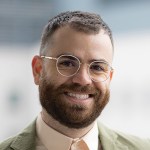
Recently, a nonbinary patient who had experienced a lot of discrimination from providers told me that, for the first time, they feel they’re in the right place. That felt life-affirming.
—Dr. Aaron Samuel Breslow
Traditionally, doctors haven’t been trained to meet the needs of their LGBTQ patients, says Aaron Samuel Breslow, Ph.D., who is Mr. Kubiszewski’s adviser and an assistant professor of psychiatry and behavioral sciences at Einstein and a clinical psychologist at Montefiore. “In medical student alumni surveys,” he notes, “doctors report receiving zero to 45 minutes of training on LGBTQ health before their residencies. As a result, we LGBTQ people often hide our identities from providers and avoid seeking care when facing mental or medical health crises.”
Dr. Breslow and his fellow educators and clinicians at Einstein and Montefiore are working to change things by making healthcare more inclusive and welcoming for LGBTQ patients and improving the care they receive in the Bronx and beyond. A priority: ensuring that Einstein students learn about the health needs of LGBTQ patients and become comfortable caring for them.
A decade ago, when Patrick Herron, D.Be., came to Einstein to work in medical education, students told him they wanted to learn more about caring for LGBTQ patients and their families. In response, Dr. Herron joined and ultimately chaired the LGBTQIA (lesbian, gay, bisexual, transgender, questioning/queer, intersex, and asexual/ally) health-curriculum working group, which was formed in 2014.
“We know from research that some LGBTQ individuals receive substandard care because many doctors—consciously or not—make assumptions about people from different backgrounds, so we set out to develop and integrate content on LGBTQ health throughout the four years of the medical school curriculum,” says Dr. Herron, who until January 2022 was Einstein’s director of bioethics education, director of operations and education programming, and associate professor of family and social medicine and of epidemiology & population health. He is now an adjunct clinical associate professor of family and social medicine at Einstein.
Since the formation of the working group, Einstein has implemented several changes to its curriculum to prepare its graduates to care for diverse patients, including those who identify as LGBTQ. The College of Medicine has been engaged in a continuous quality improvement process that includes eliminating bias from clinical skills assessments, exams, and classes.
As part of its revamped curriculum, Einstein introduced a Health Systems Sciences and Health Equity course in 2021, which students take across all four years of medical school. Einstein students learn about inequities that affect LGBTQ people and other historically marginalized groups, how students can improve their own clinical abilities, and how they can help dismantle systems that promote inequity. And the curriculum is constantly being refined, based in part on student feedback.
Benjamin Green, a fourth-year medical student at Einstein, is developing a multi-institutional research study to assess gender-diverse cultural competence among medical students, residents, and attending physicians. He credits Einstein with “increasingly incorporating gender-diversity and sexual-minority material into our training.”
Mr. Green is pursuing a career in urology, with an interest in reconstructive and gender-affirming surgery. He appreciates that his reproduction course, directed by Staci Pollack, M.D., includes the perspectives of transgender people. “Just as with any other clinical skill,” he says, “we should be objectively assessing students’ competency in caring for people from gender- and sexual-minority groups.”
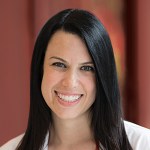
We want to ensure that all LGBTQ individuals are treated equally and with respect, no matter who their providers are.
—Dr. Lauren Roth
One of the curriculum’s leading advocates is Lauren Roth, M.D., an assistant professor of pediatrics at Einstein and a pediatrician at the Children’s Hospital at Montefiore.
She experienced a defining moment as a physician when her younger brother came out as transgender at the age of 21. “Could our pediatrician have done or said something to create a more open, accepting environment for him so we could have recognized and affirmed his authentic self sooner?” she wondered aloud. “And why weren’t we learning more about this topic in our medical training?”
Since then, Dr. Roth has dedicated her time to educating physicians about LGBTQ health. She has lectured at and hosted workshops for Einstein medical students and helped develop a “culturally humble” care curriculum for Montefiore residents. “It’s about how we can provide honest, humble care, and being respectful no matter the person’s gender identity, sexual orientation, medical needs, race, or religion,” she says. “We want to ensure that all LGBTQ individuals are treated equally and with respect, no matter who their providers are.”
On the national level, Dr. Roth serves as co-chair of the LGBTQ Health and Well-Being Special Interest Group of the Academic Pediatric Association, working to bring standardized training to future pediatricians.
Dr. Breslow says he was fortunate to grow up in an environment that supported his queer identity. He now wants to extend that sense of belonging to others. His early research on LGBTQ care and HIV prevention introduced him to the concept of “minority stress”—the idea that being marginalized in society makes it harder to get through the day and feel confident about your place in the world. “I wanted to learn how to help people in the communities that I’m part of feel better,” he says.
In 2018, Dr. Breslow seized the opportunity to realize that goal: He accepted a postdoctoral fellowship to help create the Center for Health Equity—a research lab within PRIME, the Psychiatry Research Institute at Montefiore Einstein. The center rigorously measures inequities in mental-health care. “It was exciting, but scary—like joining a startup,” he says. “The psychiatry and behavioral sciences department went out on a limb and gave us some funding to get things started.”
Dr. Breslow has since become an Einstein faculty member, and the Center for Health Equity—now staffed by 14 full-time researchers—is flourishing. So far the team has published 34 studies on topics ranging from the cost of treating depression in U.S. adults to how school-based health interventions can help marginalized kids in the Bronx. Dr. Breslow’s own work focuses on stress and its effects on the mental health of minority groups—suicide occurs all too often among transgender and nonbinary older adults—and on developing strategies for overcoming stress.
He was recently awarded a four-year, $650,000 grant from the National Institute of Mental Health to study mental-health services offered to the transgender community. The project, Mapping Interventions to Reduce Mental-Health Services Disparities Among Transgender and Nonbinary Adults, will launch this spring.
Dr. Breslow says he is especially proud of his research showing that resilience can combat stress. “The ways that we talk about mental health for transgender and nonbinary people usually concern deficits—how and why people are struggling,” he says. “We flipped the script to measure the specific strategies that minorities can use to buffer stress.”
In one study, Dr. Breslow and colleagues surveyed a diverse national sample of 552 transgender adults on how they react to stigma and stress. The results, published in 2015 in the journal Psychology of Sexual Orientation and Gender Diversity, found that cultivating personal resilience, activism, and engagement with community resources can help protect people from anxiety and depression—conditions, he says, that “turn out to be crucial for influencing mental health and survival.”
Dr. Breslow is convinced that efforts at Einstein and Montefiore to make healthcare more welcoming for LGBTQ patients are paying off. “Recently, a nonbinary patient who had experienced a lot of discrimination from providers told me that, for the first time, they feel they’re in the right place,” he says. “That felt life-affirming.”
Early in his career, Viraj V. Patel, M.D., M.P.H., an associate professor of internal medicine at Einstein and an internist at Montefiore, realized that there were few data on how to reach and engage people online in the LGBTQ community to improve health. “Education is important but rarely sufficient to change behaviors,” he says. “My question became, ‘How do we help people gain skills and empower them to take charge of their health?’”
One way Dr. Patel is tackling the issue is from a global perspective, studying how community organizations in the United States, India, and Rwanda can enhance engagement with sexual- and gender-minority populations. He recently received a five-year, $2.8 million grant from the National Institutes of Health to conduct a randomized clinical trial involving digital-messaging strategies with more than 1,000 residents of Mumbai, India, who are at high priority for HIV prevention. The trial will assess whether giving out digital coupons for free HIV-testing options alone increases healthcare engagement, or if the addition of a comprehensive information campaign about sexual-health care and connection to virtual peer counselors works better.
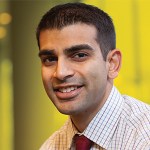
Once you get people in the door to get tested, it’s much easier to engage them to provide the education and support to keep them healthy.
—Dr. Viraj V. Patel
The Mumbai trial is using mobile dating apps and local social-media influencers to reach marginalized groups, who are often excluded from the healthcare system, and the free instant-messaging service WhatsApp to deliver tailored health information. “Once you get people in the door to get tested, it’s much easier to engage them to provide the education and support to keep them healthy,” says Dr. Patel. “Results from this study will give us insight into how to conduct virtual interventions for people who are often stigmatized and lack access to quality healthcare.”
In the Bronx, Dr. Patel is leading community-outreach efforts to gender and sexual minority populations, working to scale up the use of PrEP (pre-exposure prophylaxis) to prevent HIV infection. He is passionate about creating opportunities for medical students and residents to learn about and study LGBTQ health. “If they don’t get these opportunities now, they may never get them,” he says. “And there just are not enough people doing this work.”
Barry Zingman, M.D., professor of medicine at Einstein, medical director of Montefiore’s AIDS Center, and clinical director of infectious diseases at Montefiore’s Moses Division, has seen a dramatic shift in the populations affected by HIV over the past two decades. “Substance use and heterosexual sex as causes of HIV infection have declined significantly,” he says. “Now, in the Bronx, 70% to 80% of people newly diagnosed with HIV identify as LGBTQ.”
That shift has led to changes in research and in the delivery of care at Montefiore’s AIDS Center, including creation of a new ambulatory-care site in the program: the Oval Center at Montefiore, a comprehensive, multidisciplinary clinic for sexual-health services, HIV prevention and care, and gender-affirming care—all designed specially to meet the needs of the LGBTQ community. “We’ve been hiring staff and developing programs focused on LGBTQ needs and picking studies that might be particularly relevant to the LGBTQ community,” says Dr. Zingman. “We’ve also become a major site for LGBTQ education and training for healthcare workers.”
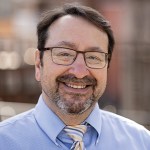
People who identify as LGBTQ receive inadequate health screenings and lack access to comprehensive care and new therapies.
—Dr. Barry Zingman
Since opening as a clinic in 1987, Montefiore’s Adolescent AIDS Program has responded to the health needs of LGBTQ youth. The program was the first in the nation to provide clinical care and support to young people living with or at risk for HIV and AIDS. In 2021, the program was renamed the Montefiore Adolescent and Youth Sexual-Health (MAYS) clinic.
“In the early days of the AIDS epidemic, many young people suffered from the stigma of being both HIV-positive and gay,” says Donna Futterman, M.D., Einstein professor emerita of pediatrics, who joined the clinic in 1989 and directed it from 1994 until she retired in 2021.
In recent years, the clinic has expanded to address the healthcare needs of transgender youth through its Umbrella Program. This program serves LGBTQ youth with comprehensive transgender and gender-nonconforming services: medical care (including testing and treatment for HIV infection and gender-affirming hormone therapy), mental-health counseling, and support services for young people and their families.
Michelle Collins-Ogle, M.D., the new director of the MAYS clinic and an assistant professor of pediatrics at Einstein, says the program “not only benefits patients but also helps educate the doctors who care for them about healthcare problems faced by pediatric and adolescent LGBTQ persons.”
For Dr. Zingman, teaching the next generation of physicians about LGBTQ health is critically important. “People who identify as LGBTQ receive inadequate health screenings and lack access to comprehensive care and new therapies, and they suffer physically and mentally because of it,” he says.
“The only way to rectify the situation is having more students, residents, and fellows who are extremely comfortable with caring for the multidisciplinary needs of LGBTQ patients,” Dr. Zingman adds.
The latest advances in LGBTQ care in the Bronx are the TransWellness Centers at Montefiore, established in 2018 as part of a comprehensive, patient-centered program for people whose gender identities do not match their sexes assigned at birth. The centers are preexisting locations within Einstein and Montefiore where adolescents and adults who are transgender or nonbinary can receive a full range of primary care, hormonal treatment, gender-affirming surgery, and HIV care. The centers plan to increase their capacity for gender-affirming surgery, which currently has a waiting list of a year or longer.
Much of the credit for the TransWellness Centers goes to Robert Beil, M.D., an internist who is the medical director of Montefiore’s program for patients with HIV and an assistant professor of medicine at Einstein. In 2014, he and colleagues from other specialties formed the Trans Health Working Group. “We eventually realized that this medical system could contain all the components needed for transgender-health care, and our efforts over the next five years to coordinate them culminated in the TransWellness Centers.”
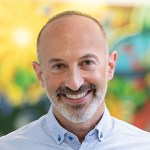
In 2014, about 50 transgender folks were receiving healthcare in the Montefiore system, and now we are up to nearly 800.
—Dr. Robert Beil
“People may get their primary care through the Oval Center but go to other Montefiore sites for things like hormonal therapy or plastic surgery,” he says. Other gender-affirming care options within Montefiore include feminizing-voice training, ob/gyn care for transgender men, and chest surgery for both transgender men and transgender women.
Due to the tremendous unmet need, the number of people seeking transgender-health care at Montefiore has soared in recent years. “In 2014, about 50 transgender folks were receiving healthcare in the Montefiore system, and now we are up to nearly 800,” says Dr. Beil, who is proud that his program treats people whom other institutions turn away.
“Transgender care is often underfunded or unfunded, so at a lot of institutions the cost of running a program is supplemented by serving people with private insurance or who pay high fees,” he says. “To treat mostly underserved groups—low-income populations, people of color, immigrants, and refugees—as we do at Montefiore is highly unusual. The support for LGBTQ care at Montefiore has come from so many sources—department chairs, senior management, individual providers, trainees, and medical students. Our local LGBTQ population really stands to benefit from their efforts.”
In 2013, Bronx residents concerned about HIV and other sexually transmitted infections had few options for care. A small clinic affiliated with Montefiore saw patients three afternoons a week, but was on the brink of losing its grant funding and closing. Enter Barry Zingman, M.D., medical director of Montefiore’s AIDS Center, the largest HIV/AIDS program in the state. Seeing a way to improve care for an underserved population, he and his team took over that small nearby clinic later that year, renamed it the Oval Center at Montefiore, and gave it a new mission.
“We designed the Oval Center to be a positive, affirming environment to address not just HIV and other sexually transmitted diseases but all facets of sexual health,” says Dr. Zingman, who is also a professor of medicine at Einstein and the clinical director of infectious diseases at Montefiore’s Moses Division. “We were the first New York State Department of Health–designated HIV/AIDS specialty center to offer comprehensive care for both those living with HIV and those at high risk for HIV infection, with a focus on LGBTQ individuals.”
The bustling clinic is open five days a week and welcomes walk-ins. It offers testing for sexually transmitted infections, pre-exposure prophylaxis (PrEP) to prevent HIV infection, and post-exposure prophylaxis for preventing infection after possible HIV exposure. Services include gender-affirming care for transgender and nonbinary people, social services and patient education, along with contraception, gynecologic, and mental-health care. Three years ago, Dr. Zingman and his team added comprehensive HIV care specifically for LGBTQ people ages 15 to 30. Over the last eight years, the number of patients served has grown from fewer than 500 to more than 5,000.
“Word of mouth is our main source of referrals,” says the Oval Center’s practice manager, Justin Toro, L.M.S.W. “Patients appreciate that appointments are readily available and long enough for providers to really listen to their concerns,” he says. “People also feel comfortable because our staff reflects the diversity of the community. We have staff who are Latinx, are African American, are LGBTQ, and/or are living with HIV or are at high risk for the disease.”
A lifelong Bronx resident who contracted HIV at age 20, Mr. Toro says he wants to create the kind of supportive environment that he wishes he’d had when he was younger. “It’s my mission to empower people to embrace their sexual practices, but at the same time to become informed and educated about the options they have to enjoy their practices safely and freely,” he says.
“LGBTQ people,” says Dr. Zingman, “are used to being disappointed, poorly treated, and not having their needs met—to being ‘less than.’ The Oval Center counters that stigma by creating a welcoming and supportive environment that people feel the moment they walk in. In some cases, we are like a surrogate family because we are among the few places where people feel they can be themselves and that they’ll be treated with respect.”